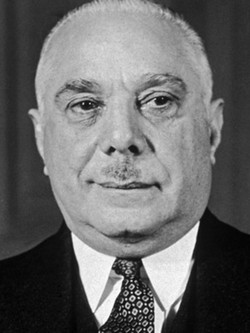
Cause of death: ballistic trauma
Rafael Leónidas Trujillo Molina ( troo-HEE-yoh, Spanish: [rafaˈel leˈoniðas tɾuˈxiʝo moˈlina]; 24 October 1891 – 30 May 1961), nicknamed El Jefe (Spanish: [el ˈxefe]), was a Dominican military commander and dictator who ruled the Dominican Republic from August 1930 until his assassination in May 1961. He served as president from 1930 to 1938 and again from 1942 to 1952, ruling for the rest of his life as an unelected military strongman under figurehead presidents. His rule of 31 years, known to Dominicans as the Trujillo Era (Spanish: El Trujillato or La Era de Trujillo), was one of the longest for a non-royal leader in the world, and centered around a personality cult of the ruling family. It was also one of the most brutal; Trujillo's security forces, including the infamous SIM, were responsible for perhaps as many as 50,000 murders. These included between 12,000 and 30,000 Haitians in the infamous Parsley massacre in 1937, which continues to affect Dominican-Haitian relations to this day.
During his long rule, the Trujillo government's extensive use of state terrorism was prolific even beyond national borders, including the attempted assassination of Venezuelan President Rómulo Betancourt in 1960, the abduction and disappearance in New York City of the Basque exile Jesús Galíndez in 1956, and the murder of Spanish writer José Almoina in Mexico, also in 1960. These acts, particularly the presumed murder of Galíndez, a naturalized US citizen, the attempted murder of Betancourt, a staunch critic of Trujillo, and the murder of the Mirabal sisters, who were among his most notable opponents, in 1960, eroded relations between the Dominican Republic and the international community and ushered in OAS sanctions and economic and military assistance to Dominican opposition forces. After this momentous year, large segments of the Dominican establishment, including the military, turned against him.
On 30 May 1961, Trujillo was assassinated by a group of conspirators led by general Antonio Imbert Barrera. In the immediate aftermath, Trujillo's son Ramfis took temporary control of the country, executing most of the conspirators. By November 1961, the Trujillo family was pressured into exile by the titular president Joaquín Balaguer, who introduced reforms to open up the regime. The murder ushered in civil strife which concluded with the Dominican Civil War and a US-OAS intervention, eventually stabilised under a multi-party system in 1966.
The Trujillo era unfolded in a Hispanic Caribbean environment particularly susceptible to dictators. In the countries of the Caribbean Basin alone, his dictatorship overlapped with those in Cuba, Nicaragua, Guatemala, El Salvador, Honduras, Venezuela and Haiti. In perspective, the Trujillo dictatorship has been judged more prominent and more brutal than its contemporaries. Trujillo remains a polarizing figure in the Dominican Republic, as the sheer longevity of his rule makes a detached evaluation difficult. While his supporters credit him for bringing long-term stability, economic growth and prosperity, doubling life expectancy of average Dominicans and multiplying the GDP, critics denounce the heavy-handed and violent nature of his regime, including the murder of tens of thousands, and xenophobia towards Haitians, as well as the Trujillo family's nepotism, widespread corruption and looting of the country's natural and economic resources.
Source : Wikipedia